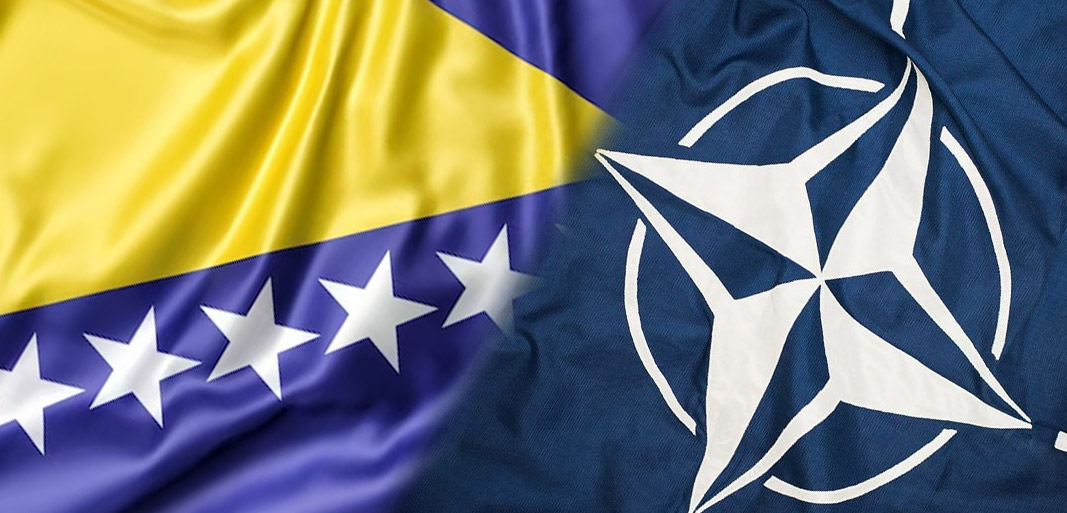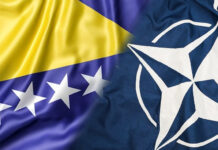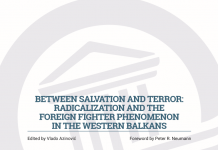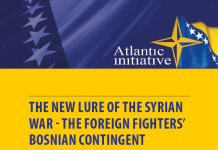By: Dejan Sajinović
From a purely rational standpoint, membership in NATO is the only viable option for Bosnia and Herzegovina (BiH), and as Professor Turčalo explained in his excellent essay on the topic, would facilitate other vitally important integrations for the country. But the fact is, the debate over NATO in BiH has never been exclusively rational, and policies in most countries are rarely rooted only in rationality. Indeed, many historians contend that the course of history has seldom been rational, shaped instead by impressions, emotions, myths, and persuasions. This has been true in BiH vis-à-vis NATO, and the country’s road to integration has thus been littered with emotional and divisive issues, driving wedges between different parts of the population.
The challenges that surround NATO integration for BiH are therefore significant and formidable. As I have always argued, BiH must remain democratic and inclusive, which means that all stakeholders must not only be free to express themselves but must also be taken into account by leaders when they formulate and execute political decisions. One cannot dismiss negative views about NATO membership emanating from the Republika Srpska, for instance. After all, every citizen has the right to be wrong. In a democracy, each voice is heard, providing it is respectful of others.
Practically speaking, this creates a “drag” on the democratic process of decision making, particularly in the context of the current constitutional structure of BiH, and not only on matters related to NATO. However, until someone comes up with a better and more efficient model, we are “stuck” with a Western-style democracy, and until the political will develops for real reform, we are stuck with the Dayton structure; and we will have to learn to live with both. So, the question is: If it is in the interest of all citizens of BiH that the country moves closer to NATO, how can opposition to this be overcome in an inclusive and democratic way?
As I see it, the answer lies in history and has already been tested throughout the ages. Simply put, the answer is leadership. Effective leadership can close the gap between decision-making and dissent by recognizing the impossibility of complete consensus while remaining committed to the meaningful participation of all citizens, and can inspire some people to adopt new ways of seeing and doing things. Even in democracies, where the majority rules, social progress is often due to leaders who challenge the will of that majority and convince people to experiment with a new social order.
There are examples of leaders in the private sector who have also proposed new ideas before the general consensus has caught up. Take the late Apple founder Steve Jobs, whose idea to develop touch screens for smart phones was initially rejected by the industry, which assumed they would be clumsy, difficult to use, and would consume too much battery. Jobs forged ahead nonetheless and went on to realize his vision in spectacular fashion, not only proving the sceptics wrong but launching a technological revolution.
Similarly, when innovative or forward thinking occurs in the social and political spheres, it is not always matched by majority support. In some places, the passage of laws protecting the rights of LGBTQ people is a present-day demonstration of this. Despite opposition by many citizens in BiH, for example, these laws are necessary to ensure that the state guarantees and enforces the same rights for all, as called for by the principles of democracy. The law often works this way, to enforce values that may not be respected by all of society but are essential to maintaining a democratic social order.
Returning to NATO accession for BiH, then, it is clear that its practical advantages must be promoted but also that visionary leadership and bold decision-making are required to advance the process. This will inevitably be met with opposition, criticism, and perhaps even some active (nonviolent) resistance, but this is the democratic way; everyone is free to participate, to act politically, and to articulate their vision, provided they respect the law and other people’s fundamental human rights. In a functioning democracy, keeping these freedoms and rights in balance is always the goal. Still, a democracy also rests on a foundation of democratically elected and appointed officials, as well as a professional public administration, functioning in a responsible and accountable manner for the benefit of all of society. Sometimes, this means making decisions even if they are unpopular with some stakeholders. This is also the democratic way.
In this sense, a country and its citizens are much like a plane full of passengers, each of whom “votes” about where and when they want to fly, but who leave it up to the pilot to get them there safely. In the case of bad weather or an emergency en route, the pilot does not ask the passengers to weigh in on which path around the storm to take, or where to land. Once the passengers buy their tickets and board the plane, they are at the mercy of the pilot to transport them safely. If the pilot and crew is bound by sufficient flight safety regulations, passengers can reasonably assume that the appropriate protocols will be followed to ensure the best decision-making on their behalf.
In BiH, every citizen – whether they live in the Republika Srpska or the Federation, whether they identify as Serbs, Croats, Bosniaks, Bosnians, or anything else – ultimately wants the same thing: safety, stability, a promising future for the next generation, and the opportunity to prosper. How to achieve this for all citizens should be the preoccupation of any elected (or appointed) official in BiH, and should inform any policies they enact. These officials are flying the plane, and the citizens are their passengers. Hence, on the question of NATO membership, these officials must clarify that NATO itself is not the goal, but that it is a necessary means to meeting the security interests of all citizens in BiH.
Some may say the country should hold a referendum on NATO membership, essentially handing the controls of the plane over to the passengers. Yet, the current constitutional structure of BiH makes a truly representative referendum unfeasible, and given the lack of broad public consensus on the issue, is likely to leave us right back where we started. This leaves only two choices for leaders in BiH: remain stuck forever in limbo making no progress, or take bold and visionary steps to convince the sceptics that NATO integration is the best way to provide the safety and stability citizens are seeking. Without this kind of leadership, I fear an(other) unthinkable disintegration into chaos and war; something I think it is fair to say that no citizen of this county wants. And, while some politicians in BiH apparently believe that such a disintegration is possible without sparking a war, I defer to the judgement of every citizen who knows better, and who understands that a descent into conflict is no option at all.
Citizens in BiH are calling for a safer and more secure existence, delivered responsibly by a government on which they can depend. They are aware that consensus is not always, or ever, possible, and it is not perfection they desire, just political competence. This offers leaders an opening when it comes to NATO integration, especially as the Law on Defense already proclaimed NATO membership a goal and was adopted by votes cast by all parties from both entities. Clearly, the government has a mandate for integration, which means it is up to visionary leaders to make the case as to why and how this will benefit the country and its citizens. This should involve vigorous but respectful public debate that draws on and contemplates ideas such as those put forth by Professor Turčalo in his essay. This debate must be vigorous, yet at the same time, sensitive to the emotional weight of these issues for many citizens in BiH. For example, citizens in the Republika Srpska must not only feel they are being heard but that their views are not being ridiculed, dismissed, or judged as hostile.
It will take some time to achieve full NATO integration for BiH. But if we look around, we can see on an almost daily basis how the country’s partnership with NATO is already benefitting citizens. Indeed, the peace is sustained by EUFOR and NATO – the presence of which has been key to keeping current political crises from escalating, and has made the Armed Forces of BiH ever more capable. This is a solid foundation on which to build a more stable and secure BiH, so long as NATO representatives approach the country’s citizens respectfully, value their perspectives, and engage with them in dialogue.
To foster this engagement, officials in BiH should carefully weigh their public statements, avoiding inflammatory or confrontational language and setting an example of civil discourse that leaves space for other views. Not all politicians will be up to the task, however. Some, unable to resist their populist instincts, will almost certainly continue to use NATO as a wedge issue. Some lack the political will or bravery to make bold but unpopular decisions, even for the greater good of their constituency. Therefore, it must be the task of those of us in media, civil society, and other public facing professions to engage in dialogue on this subject (and others) that is grounded in mutual respect among all citizens. If we can do so, and I see no reason to doubt that we can, we can help move BiH towards greater safety and security by supporting a collective process that informs and shapes visionary leadership.








